-
EXPERIENCE REPORT10-25-2022
Patients who experience systemic lupus erythematosus and leg ulcer: phenomenological approach
Revista Brasileira de Enfermagem. 2022;75(2):e20200081
Abstract
EXPERIENCE REPORTPatients who experience systemic lupus erythematosus and leg ulcer: phenomenological approach
Revista Brasileira de Enfermagem. 2022;75(2):e20200081
DOI 10.1590/0034-7167-2020-0081
Views0See moreABSTRACT
Objective:
To understand the experience of a woman with systemic lupus erythematosus and leg ulcers with cutaneous calcinosis.
Methods:
An experience report based on the social phenomenology of Alfred Schutz, conducted with a young woman undergoing treatment in an outpatient service.
Results:
The disease manifested itself in adolescence and brought emotional instability associated with body image concern and social isolation. The discontinuation of the studies triggered financial limitations with implications for treatment. The presence of ulcers aggravated by skin calcification makes the process of getting sick tiring and painful. Interpersonal relationships are resources for coping with situations experienced.
Final considerations:
Patients with lupus may have social, affective, and family life, even in the face of the limitations imposed by the disease. However, the emergence of leg ulcer with calcinosis changes this situation.
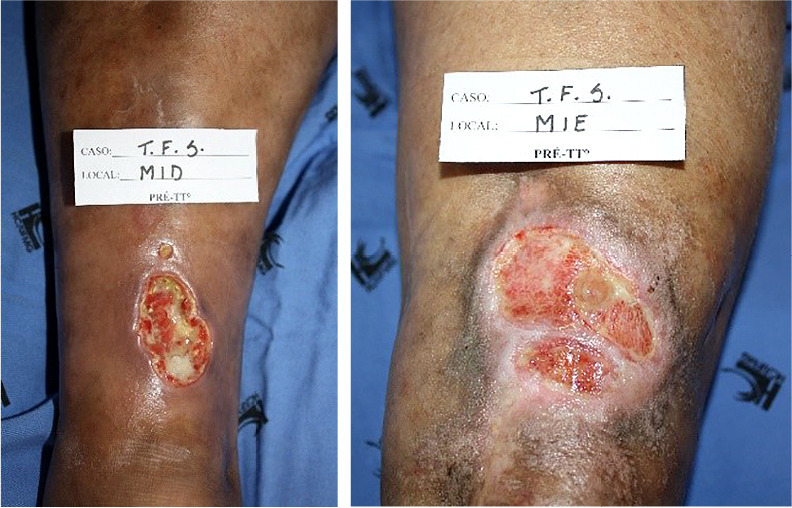
-
ORIGINAL ARTICLE10-25-2022
COVID-19 pandemic and nursing week: analysis from software Iramuteq
Revista Brasileira de Enfermagem. 2022;75:e20200690
Abstract
ORIGINAL ARTICLECOVID-19 pandemic and nursing week: analysis from software Iramuteq
Revista Brasileira de Enfermagem. 2022;75:e20200690
DOI 10.1590/0034-7167-2020-0690
Views0See moreABSTRACT
Objective:
to analyze the themes of publications on the Federal Council of Nursing (Cofen) website during Nursing Week 2020.
Method:
documentary, qualitative research, whose data sources were publications on the Cofen website from May 12 to 20, 2020. Data were processed by software IRAMUTEQ®, through the Descending Hierarchical Classification and analyzed under the historical materialism framework.
Results:
thirty publications were analyzed, giving rise to five classes.
Final considerations:
the themes published in the period investigated pointed to the grief experienced by the category, due to the death of its members, and the fight for better working conditions. Overcoming the pandemic involves recognizing science and the Unified Health System, protecting nursing workers’ health and fighting misinformation and fake news.
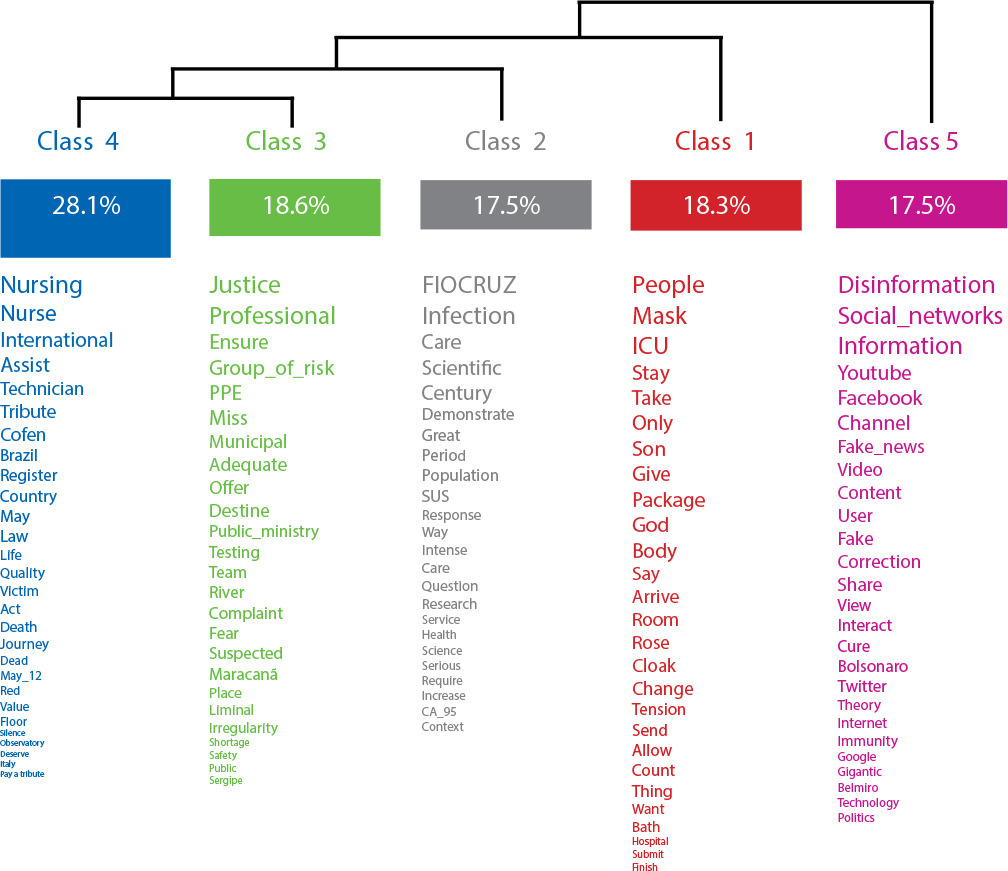
-
ORIGINAL ARTICLE10-25-2022
Online mental health care during the COVID-19 pandemic
Revista Brasileira de Enfermagem. 2022;75:e20210554
Abstract
ORIGINAL ARTICLEOnline mental health care during the COVID-19 pandemic
Revista Brasileira de Enfermagem. 2022;75:e20210554
DOI 10.1590/0034-7167-2021-0554
Views0See moreABSTRACT
Objective:
Identify users, services, and reasons for seeking online mental health care during the COVID-19 pandemic.
Methods:
A descriptive, retrospective study, with documentary analysis of medical records of users served between April and July 2020.
Results:
Of the 258 accesses, 159 were complete, and 99 were offline messages. Although there were 61 (38.36%) consultations in May, in April, there were 49 (30.82%) in 18 days of reception. More than 89% of accesses were women between 40 and 59 years. Among the motivations in the search for care, anxiety, fear, depression, sadness, crying, stress, and suicidal ideation stand out.
Final considerations:
Chat is a quick, early and short-wait intervention opportunity for people in need of mental health care. Therefore, the study emphasizes the importance of investing in the training of nursing professionals to act in mental health.

-
ORIGINAL ARTICLE10-25-2022
Planned home birth assistance: challenges during the COVID-19 pandemic
Revista Brasileira de Enfermagem. 2022;75:e20210083
Abstract
ORIGINAL ARTICLEPlanned home birth assistance: challenges during the COVID-19 pandemic
Revista Brasileira de Enfermagem. 2022;75:e20210083
DOI 10.1590/0034-7167-2021-0083
Views0See moreABSTRACT
Objective:
To understand the challenges faced by urban midwives in assisting planned home births during the COVID-19 pandemic.
Methods:
Qualitative study, based on the Collective Subject Discourse methodological framework, carried out with eight professionals, members of a birth care collective from the northeast region of Brazil. Data was collected between September and October of 2020 using the focus group technique.
Results:
The collective discourses revealed five central ideas: Changing assistance strategy; Dealing with frustration; Facing the fear of contamination; Avoiding exposure to the virus; and Keeping distance during the care process.
Final considerations:
The challenging condition the pandemic brings to the care of planned home births is made evident, being marked by the need for collective protection and the pressure of following health recommendations. The study also points out the need for official protocols and good quality information based on scientific evidence and humanizing principles to guide health care.
-
ORIGINAL ARTICLE10-25-2022
Brazilian nursing in pandemic times and the bicentennial of Florence Nightingale
Revista Brasileira de Enfermagem. 2022;75:e20210081
Abstract
ORIGINAL ARTICLEBrazilian nursing in pandemic times and the bicentennial of Florence Nightingale
Revista Brasileira de Enfermagem. 2022;75:e20210081
DOI 10.1590/0034-7167-2021-0081
Views0See moreABSTRACT
Objective:
To reflect on the role of Brazilian nursing during the COVID-19 pandemic, considering as a historical landmark the bicentenary of the birth of Florence Nightingale, a precursor of modern nursing, celebrated in 2020.
Method:
Theoretical-reflective study, based on Florence Nightingale’s environmental theory through a literature review, carried out in international and national virtual news from different sources and added to the authors’ experiences related to the pandemic.
Results:
It was possible to identify the weaknesses experienced by nurse practitioners as to contagion by COVID-19, the routine of exposure to risks, the lack of adequate protection in many scenarios, the high rates of illness, and also deaths that occurred in this profession.
Final considerations:
Florence Nightingale’s Environmental Theory describes the importance of the adequacy of the work environment. It also emphasizes the value of this professional for contemporary nursing and the redefinition of this professional category during the COVID-19 pandemic.
-
ORIGINAL ARTICLE10-24-2022
Avoidable deaths in the first 24 hours of life: health care reflexes
Revista Brasileira de Enfermagem. 2022;75(1):e20220027
Abstract
ORIGINAL ARTICLEAvoidable deaths in the first 24 hours of life: health care reflexes
Revista Brasileira de Enfermagem. 2022;75(1):e20220027
DOI 10.1590/0034-7167-2022-0027
Views0See moreABSTRACT
Objectives:
to analyze the risks of deaths in the first 24 hours of life and their preventable causes.
Methods:
cross-sectional study carried out in Pernambuco, Northeast of Brazil, between 2000-2019, with mortality and live birth data. The avoidability was analyzed through the Brazilian List of Avoidable Causes of Deaths due to Interventions of the Unified Health System. For the statistical analyses, Pearson’s chi-squared test and relative and attributable risks were used.
Results:
13,601 deaths were registered, of which 10,497 (77.19%) were from preventable causes. Of the total, 5,513 (40.53%) were reducible through adequate care for women during pregnancy. The lower the gestational age, birth weight and education level, the higher the relative and attributable risk of death in the first 24 hours of life.
Conclusions:
most of the deaths were considered avoidable and with high relative and attributable risks. These early deaths suggest care failures and the need to reinforce prevention and treatment measures.
-
ORIGINAL ARTICLE10-24-2022
Factors associated with symptoms of physical and emotional burden in informal caregivers of the elderly
Revista Brasileira de Enfermagem. 2022;75:e20210927
Abstract
ORIGINAL ARTICLEFactors associated with symptoms of physical and emotional burden in informal caregivers of the elderly
Revista Brasileira de Enfermagem. 2022;75:e20210927
DOI 10.1590/0034-7167-2021-0927
Views1See moreABSTRACT
Objectives:
to analyze the personal and work-related burden factors associated with physical and emotional symptoms of informal caregivers of the elderly.
Methods:
cross-sectional study conducted with 121 informal caregivers and 121 seniors who received care, assessed individually for the risk of: physical overload, musculoskeletal symptoms, Self-Reporting Questionnaire, effort perception, and Katz index.
Results:
a greater perception of effort raises up to 3.3 times the chances of presenting symptoms of pain in the spine region (p=0.01), and lower functional capacity of the elderly increases up to 1.3 times the chances of presenting pain symptoms in the spine region (p=0.02). The symptoms of emotional overload were associated with the caregiver’s low income (p=0.02).
Conclusions:
the perception of effort, dependence of the elderly, caregiver’s age, and symptoms of emotional overload are involved with caregivers’ symptoms of physical overload, and low income, with emotional overload.
-
ORIGINAL ARTICLE10-24-2022
Development and testing of the Prev’Quedas game for older adults in the community: a descriptive study
Revista Brasileira de Enfermagem. 2022;75:e20220098
Abstract
ORIGINAL ARTICLEDevelopment and testing of the Prev’Quedas game for older adults in the community: a descriptive study
Revista Brasileira de Enfermagem. 2022;75:e20220098
DOI 10.1590/0034-7167-2022-0098
Views0See moreABSTRACT
Objectives:
to develop and test a board game for fall prevention in older adults in the community.
Methods:
a descriptive study, carried out through the use of game design elements (narrative, mechanics, aesthetics and technology), the Health Promotion Model, assessment by experts and testing with older adults. For assessment, the Concordance Index was used, considering it greater than 80%.
Results:
three prototypes and the final version were developed. The game’s narrative was based on promotion model, comprising individual aspects, benefits and barriers in behavior to prevent falls. The mechanics outlined goals and rules. Aesthetics encompassed layout and illustrations. The technology involved board, cards, pin, roulette and instruction manual. The game was assessed by 36 experts and 31 older women from the community, with a Concordance Index of 93.22% and 99%, respectively.
Conclusions:
the game developed and tested was considered an adequate educational strategy for fall prevention.

-
ORIGINAL ARTICLE04-09-2020
Factors associated with the discontinuance of outpatient follow-up in neonatal units
Revista Brasileira de Enfermagem. 2020;73(3):e20180793
Abstract
ORIGINAL ARTICLEFactors associated with the discontinuance of outpatient follow-up in neonatal units
Revista Brasileira de Enfermagem. 2020;73(3):e20180793
DOI 10.1590/0034-7167-2018-0793
Views1See moreABSTRACT
Objectives:
to identify predisposing and enabling factors as well as the health needs associated with the discontinuance of outpatient follow-up of newborns who were hospitalized at neonatal intensive care unit.
Methods:
cross-sectional study, using the behavioral model of health services use. The study was composed of 358 mothers and newborns referred to the outpatient follow-up after discharge. Characterization, perception of social support, postnatal depression, and attendance to appointments data were collected, analyzed by the R software (3.3.1).
Results:
outpatient follow-up was discontinued by 31.28% of children in the first year after discharge. In multiple regression analysis, the chance of discontinuance was higher for newborns who used mechanical ventilation (OR = 1.68; 95%CI 1.04-2.72) and depended on technology (OR = 3.54; 95%CI 1.32-9.5).
Conclusions:
predisposing factors were associated with the discontinuance of follow-up; enabling factors and health needs did not present a significant association. Children with more complex health conditions require additional support to participate in follow-up programs, thus ensuring the continuity of care.

-
ERRATUM02-26-2024
ERRATUM
Revista Brasileira de Enfermagem. 2024;77(1):e20160061
Abstract
ERRATUMERRATUM
Revista Brasileira de Enfermagem. 2024;77(1):e20160061
DOI 10.1590/0034-7167.20247701e03
Views2In the article “Nurses in the labor market: professional insertion, competencies and skills”, with DOI number: , published in Revista Brasileira de Enfermagem, 2017;70(6):1220-6, on page 1225:Include before REFERENCES:[…]See more -
REVIEW12-08-2024
Interventions for Strengthening General Self-Efficacy Beliefs in College Students: An Integrative Review
Revista Brasileira de Enfermagem. 2024;77(1):e20230192
Abstract
REVIEWInterventions for Strengthening General Self-Efficacy Beliefs in College Students: An Integrative Review
Revista Brasileira de Enfermagem. 2024;77(1):e20230192
DOI 10.1590/0034-7167-2023-0192
Views0See moreABSTRACT
Objective:
To assess the evidence regarding the effectiveness of interventions aimed at strengthening self-efficacy beliefs in college students.
Methods:
Integrative Review conducted on the Lilacs, PubMed, CinahL, Cochrane Collaboration Databases, Scopus, and PsycInfo databases. The methodological quality of the studies was assessed using tools proposed by the Joanna Briggs Institute, and the results were analyzed descriptively.
Results:
Out of the 10 selected studies, six demonstrated that interventions aimed at strengthening self-efficacy were effective (Levels of Evidence II and III), and four revealed contrary results (Levels of Evidence I and II). Programs aimed at enhancing self-efficacy should include content on positive mental health, psychoeducation strategies, cover a period of eight to twelve weeks, and consider the completion of homework assignments.
Conclusion:
The synthesis of evidence pointed to pathways for building an effective self-efficacy strengthening program to be implemented in universities.

-
ORIGINAL ARTICLE05-13-2024
Generalized Resistance Deficits in inmates with hypertension: missing resources that limit health
Revista Brasileira de Enfermagem. 2024;77(2):e20230246
Abstract
ORIGINAL ARTICLEGeneralized Resistance Deficits in inmates with hypertension: missing resources that limit health
Revista Brasileira de Enfermagem. 2024;77(2):e20230246
DOI 10.1590/0034-7167-2023-0246
Views0See moreABSTRACT
Objective:
to understand the Generalized Resistance Deficits of people deprived of liberty with hypertension in a Brazilian prison unit.
Method:
qualitative research, anchored in Salutogenesis, carried out with 38 people with hypertension from a Brazilian prison unit, from February to July 2022, with a semi-structured interview with open-ended questions, whose analysis was thematic, explaining the limitations to health in prison.
Results:
13 Generalized Resistance Deficits were reported, mostly related to the prison environment and, to a lesser extent, to the social group and the individual, respectively. Living in prison for people with hypertension implies living with a high number of Generalized Resistance Deficits, accentuating the movement towards the disease pole.
Final considerations:
knowing Generalized Resistance Deficits allows directing health promotion to support the use of available Generalized Resistance Resources and contributes to the expansion of intersectoral policies.

-
ERRATUM06-14-2024
ERRATUM
Revista Brasileira de Enfermagem. 2024;77(2):e2024n2e05
Abstract
ERRATUMERRATUM
Revista Brasileira de Enfermagem. 2024;77(2):e2024n2e05
DOI 10.1590/0034-7167.20247702e05
Views2In the article “Educational technologies used to promote self-care for people with diabetes mellitus: integrative review”, with DOI number: , published in Revista Brasileira de Enfermagem, 2023;76(Suppl 4):e20230049, in the title:Where it read:[…]See more -
ERRATUM06-14-2024
ERRATUM
Revista Brasileira de Enfermagem. 2024;77(2):e2024n2e06
Abstract
ERRATUMERRATUM
Revista Brasileira de Enfermagem. 2024;77(2):e2024n2e06
DOI 10.1590/0034-7167.20247702e06
Views2In the article “Is there scientific relevance to the plot of films and documentaries about eating disorders?”, with DOI number: , published in Revista Brasileira de Enfermagem, 2024;77(1):e20220547, page 7:Where it read:[…]See more -
REVIEW07-29-2024
Profile of scientific production on nursing technology construction, validity and application: a bibliometric study
Revista Brasileira de Enfermagem. 2024;77(3):e20230452
Abstract
REVIEWProfile of scientific production on nursing technology construction, validity and application: a bibliometric study
Revista Brasileira de Enfermagem. 2024;77(3):e20230452
DOI 10.1590/0034-7167-2023-0452
Views1See moreABSTRACT
Objective:
to analyze the profile of scientific production on nursing technology construction, validity and application.
Methods:
this is a bibliometric study, carried out in six databases, based on the Methodi Ordinatio application, arranged in nine stages. To represent the findings, the VOSviewer® software was used.
Results:
346 studies were identified, obtained from BDENF, CINAHL, EMBASE, LILACS, PubMed/MEDLINE, Scopus and Web of Science. There was a predominance of the English language, and 20% of the authors hold more than 25% of studies. Only two journals account for 25% of studies in the period studied. Twenty-six studies were selected for the InOrdinatio classification. Nursing Process (23%) stood out among the studies. The most produced technology was software (27%), and 50% of works describe construction and validity.
Conclusions:
there is an emphasis on the creation of educational technologies, especially information technology. The data demonstrates opportunities for future research in the area.

-
ORIGINAL ARTICLE01-10-2024
Inventory of ethical problems in mobile pre-hospital care
Revista Brasileira de Enfermagem. 2024;77:e20230539
Abstract
ORIGINAL ARTICLEInventory of ethical problems in mobile pre-hospital care
Revista Brasileira de Enfermagem. 2024;77:e20230539
DOI 10.1590/0034-7167-2023-0539
Views1See moreABSTRACT
Objective:
to construct and validate the content of an inventory of ethical problems experienced by nurses in mobile pre-hospital care.
Method:
a psychometric approach study, developed with the following stages: (1) instrument construction through a theoretical matrix based on deliberative bioethics, scoping review and online qualitative research; (2) content validity by judges; (3) pre-testing with Mobile Emergency Care Service nurses in various Brazilian states. For content validity analysis, the Content Validity Ratio was calculated (CVR>0.45 for judges and CVR>0.35 for the target population).
Results:
the instrument had 44 items, distributed across four dimensions.
Final considerations:
the constructed instrument presented sources of evidence of content validity, providing good psychometric measurements and constituting a useful tool for nurses’ practice in the pre-hospital setting.

-
08-19-2019
Institutional strategies to prevent violence in nursing work: an integrative review
Revista Brasileira de Enfermagem. 2019;72(4):1052-1060
Abstract
Institutional strategies to prevent violence in nursing work: an integrative review
Revista Brasileira de Enfermagem. 2019;72(4):1052-1060
DOI 10.1590/0034-7167-2018-0687
Views0See moreABSTRACT
Objective:
To analyze the production of research that adopted as object of investigation: institutional strategies, actions and programs to curb and/or prevent the nursing workplace violence.
Method:
Integrative review of 14 articles in full, available in the databases LILACS, PubMed Central, Scopus, CINAHL and Web of Science.
Results:
Of the articles analyzed, most arise from quantitative research (71%), carried out in the United States (65%), with educational actions (57%) and programs (43%), denoting policies.
Conclusion:
Results showed various ways to curb or prevent nursing workplace violence. These are specific strategies, there are few programs deployed worldwide, usually centered in the United States, Canada and Sweden. Most of them is well evaluated and can serve as a model for the development and dissemination of policies according to the needs of each location.
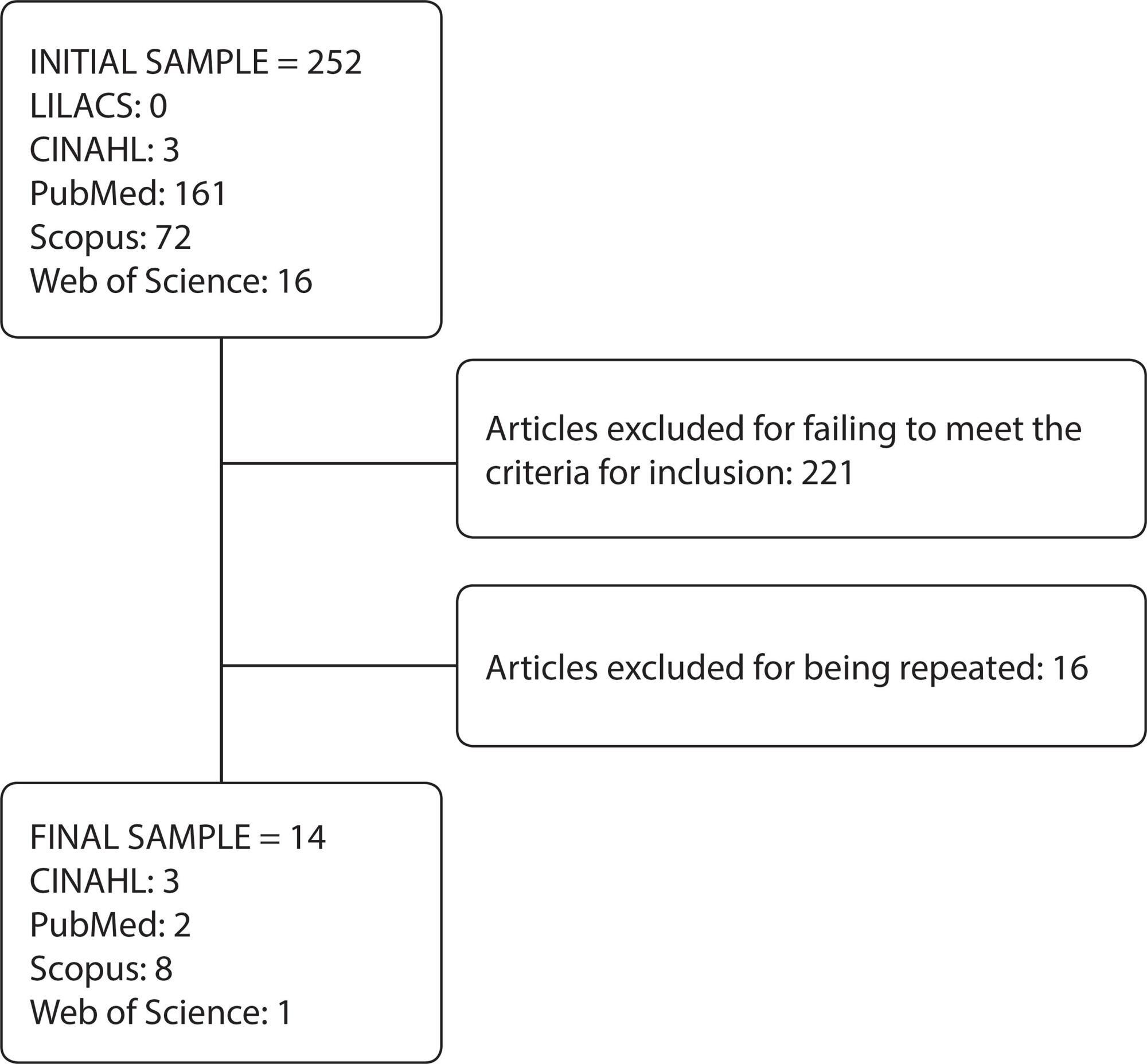
-
08-19-2019
Professional education on dementias in Primary Health Care: an integrative review
Revista Brasileira de Enfermagem. 2019;72(4):1086-1093
Abstract
Professional education on dementias in Primary Health Care: an integrative review
Revista Brasileira de Enfermagem. 2019;72(4):1086-1093
DOI 10.1590/0034-7167-2018-0652
Views0See moreABSTRACT
Objective:
To investigate the most commonly used educational approaches in dementia training for primary health care professionals.
Method:
Integrative literature review, conducted between April and June of 2018, in PubMed, LILACS and IBECS databases. The descriptors used were: Training, Health Personnel, Dementia, Primary Health Care for PubMed; and the MeSH terms, Training Programs, Health Personnel, Dementia, and Primary Health Care for LILACS and IBECS.
Results:
The sample consisted of 13 articles; eight were published in the last five years (62%); seven articles with a quantitative approach (54%); seven articles produced on the European continent (54%), followed by five published on the North American continent (38%). All journals were from the health area (100%).
Conclusion:
Educational strategies were combined and used for education. Significant improvements in knowledge, skills, and attitudes of the teams with regard to professional management of dementias were evidenced.

-
ORIGINAL ARTICLE12-05-2019
Factors associated with metabolic syndrome in older adults: a population-based study
Revista Brasileira de Enfermagem. 2019;72:221-228
Abstract
ORIGINAL ARTICLEFactors associated with metabolic syndrome in older adults: a population-based study
Revista Brasileira de Enfermagem. 2019;72:221-228
DOI 10.1590/0034-7167-2018-0620
Views0See moreABSTRACT
Objective:
To estimate the prevalence of the metabolic syndrome and clusters of its components and to identify possible associated factors in older adults.
Method:
Cross-sectional and population-based study, involving 271 older people. We collected sociodemographic, behavioral, clinical, biochemical, and anthropometric data. Data were analyzed by descriptive and logistic regression techniques.
Results:
The prevalence of metabolic syndrome was 59% and was associated with women, overweight/obesity, and the C-reactive protein. Concerning the clusters, 11.4% of the sample had all the components of the metabolic syndrome, and only 5.2% of individuals did not have any of its components.
Conclusion:
We found there is a high prevalence of metabolic syndrome and clusters of its components in older adults. It is important to deepen studies on this matter, considering clinical aspects in relation to sex and healthy behavioral habits for creating public policies as well as emphasizing actions aimed at promoting self-care in all cycles of life.

-
ORIGINAL ARTICLE02-10-2020
Common mental disorders in nursing students of the professionalizing cycle
Revista Brasileira de Enfermagem. 2020;73(1):e20180154
Abstract
ORIGINAL ARTICLECommon mental disorders in nursing students of the professionalizing cycle
Revista Brasileira de Enfermagem. 2020;73(1):e20180154
DOI 10.1590/0034-7167-2018-0154
Views0See moreABSTRACT
Objectives:
to verify the suspicion of common mental disorders in nursing students of the professionalizing cycle and the association with sociodemographic features.
Method:
cross-sectional study with a sample of 85 students from a public university in the state of Rio de Janeiro (RJ) who responded to the Self-Report Questionnaire-20 and sociodemographic questions.
Results:
the suspicion prevalence of common mental disorders (CMD) in the sample was 55.3% and it was identified the association with the consumption of alcohol. Of the most frequent SRQ-20 complaints, 95.3% reported “feeling nervous, tense or worried”, 72.9% “having difficulty making decisions”, 60% “sleeping poorly” and 37.6% “having lost interest by things “.
Conclusion:
high prevalence of CMD in the sample and the association with the consumption of alcohol requires preventive and therapeutic actions among the students that minimize the possibility of severe mental disorders related to the consumption of alcohol and other drugs.
-
REVIEW07-13-2020
Prevention and control measures for neonatal COVID-19 infection: a scoping review
Revista Brasileira de Enfermagem. 2020;73:e20200467
Abstract
REVIEWPrevention and control measures for neonatal COVID-19 infection: a scoping review
Revista Brasileira de Enfermagem. 2020;73:e20200467
DOI 10.1590/0034-7167-2020-0467
Views0See moreABSTRACT
Objective:
to identify with the literature the measures to prevent and control neonatal infection by COVID-19.
Methods:
a scope review carried out by searching for studies in databases and institutional health websites. The final sample was 25 articles.
Results:
among the main measures are the use of masks by suspected or infected people in contact with healthy newborns, hand hygiene before and after each care and feeding as well as the tools used for milking. It is indispensable to use personal protective equipment by health professionals in neonatology services to maintain a private room for infected newborns or to use physical barriers. Early diagnosis and timely case management is essential to reduce virus transmissibility.
Conclusions:
the research contributed to elucidate health and nursing actions in preventing and controlling neonatal infection by COVID-19.

-
ORIGINAL ARTICLE06-27-2019
Insertion of central vascular catheter: adherence to infection prevention bundle
Revista Brasileira de Enfermagem. 2019;72(3):774-779
Abstract
ORIGINAL ARTICLEInsertion of central vascular catheter: adherence to infection prevention bundle
Revista Brasileira de Enfermagem. 2019;72(3):774-779
DOI 10.1590/0034-7167-2018-0124
Views0See moreABSTRACT
Objective:
To evaluate the compliance of the care process involving insertion of central vascular catheter (CVC) in hemodialysis.
Method:
Cross-sectional quantitative approach developed at the hemodialysis service of a reference hospital in Sergipe, Brazil. Sample consisting of 1,342 actions evaluated, corresponding to 122 forms for monitoring and control of CVC insertion. Data collection was held from July to December 2016.
Results:
The adherence rate to the use of the insertion form was 54.9%. The procedure evaluated achieved 93% overall compliance. Of the 11 specific actions observed, seven (64%) presented 100% compliance. The density of the overall incidence of primary bloodstream infections reduced from 10.6 to 3.1 infections per 1,000 patients/day.
Conclusion:
Although the observed actions reached specific desired conformities, the use of the checklist was lower than expected. Strategies for monitoring, coaching and educational and organizational actions can contribute to safe care.
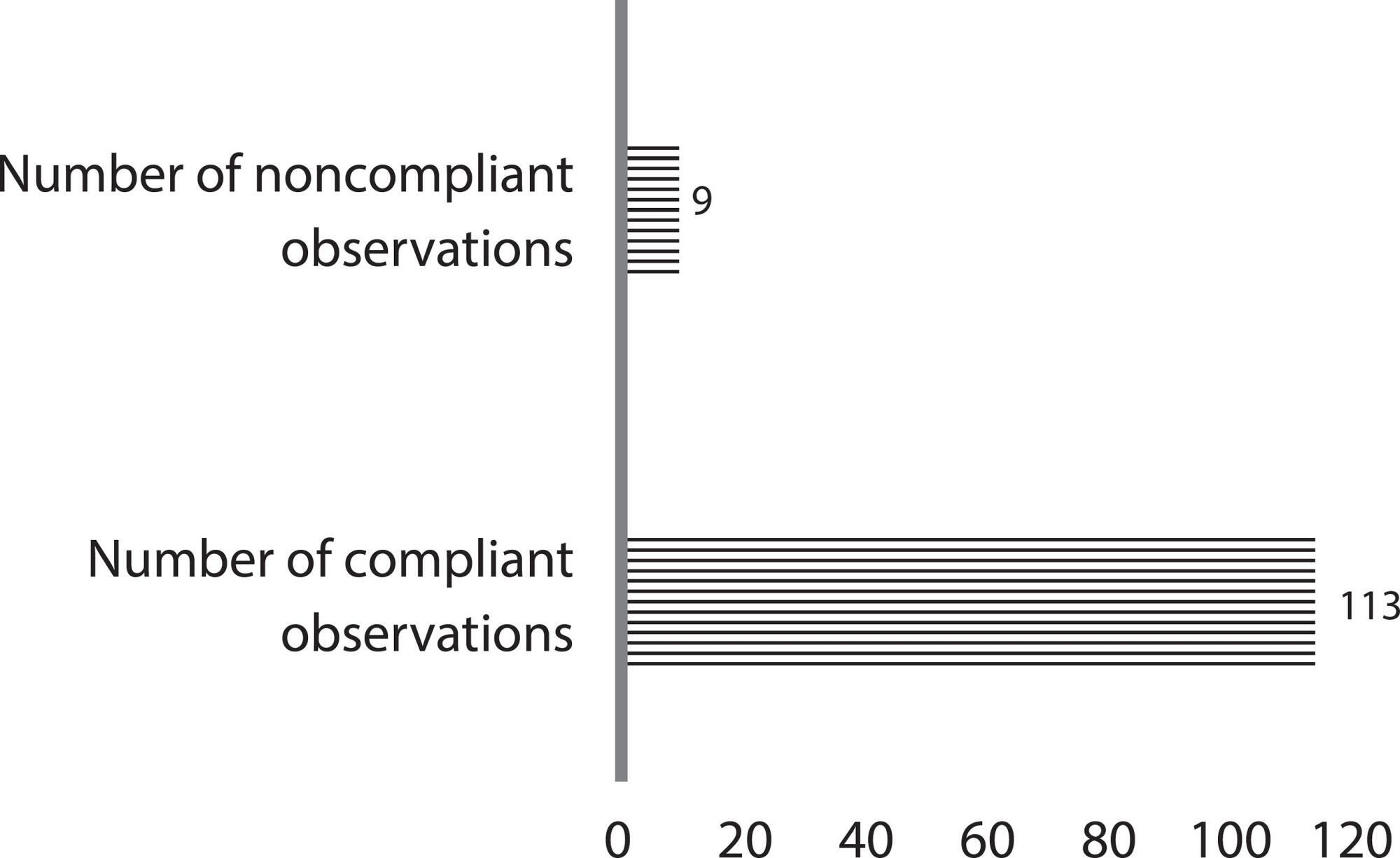
-
REVIEW06-17-2020
Prevention and conduct against the Extravasation of antineoplastic chemotherapy: a scoping review
Revista Brasileira de Enfermagem. 2020;73(4):e20190008
Abstract
REVIEWPrevention and conduct against the Extravasation of antineoplastic chemotherapy: a scoping review
Revista Brasileira de Enfermagem. 2020;73(4):e20190008
DOI 10.1590/0034-7167-2019-0008
Views0See moreABSTRACT
Objectives:
to identify and synthesize scientific evidence on prevention and management of extravasation of antineoplastic agents in adult patients by nurses.
Methods:
scoping review, according to Joanna Briggs Institute and PRISMA-ScR. Research was conducted in five electronic databases, Cochrane Library and eight catalogs of theses and dissertations. Data collection occurred from April to July 2018, with no time limit. The extracted data were analyzed and synthesized in a narrative way.
Results:
a total of 3,110 records were retrieved and 18 studies were kept for review. Most publications (66.6%) had a qualitative approach and addressed both aspects, i.e., prevention and management of extravasation of chemotherapy in adult patients.
Conclusions:
the implementation of protocols based on scientific evidence on prevention and management of extravasation of antineoplastic agents is paramount in order to provide patient safety and support to the nursing staff.
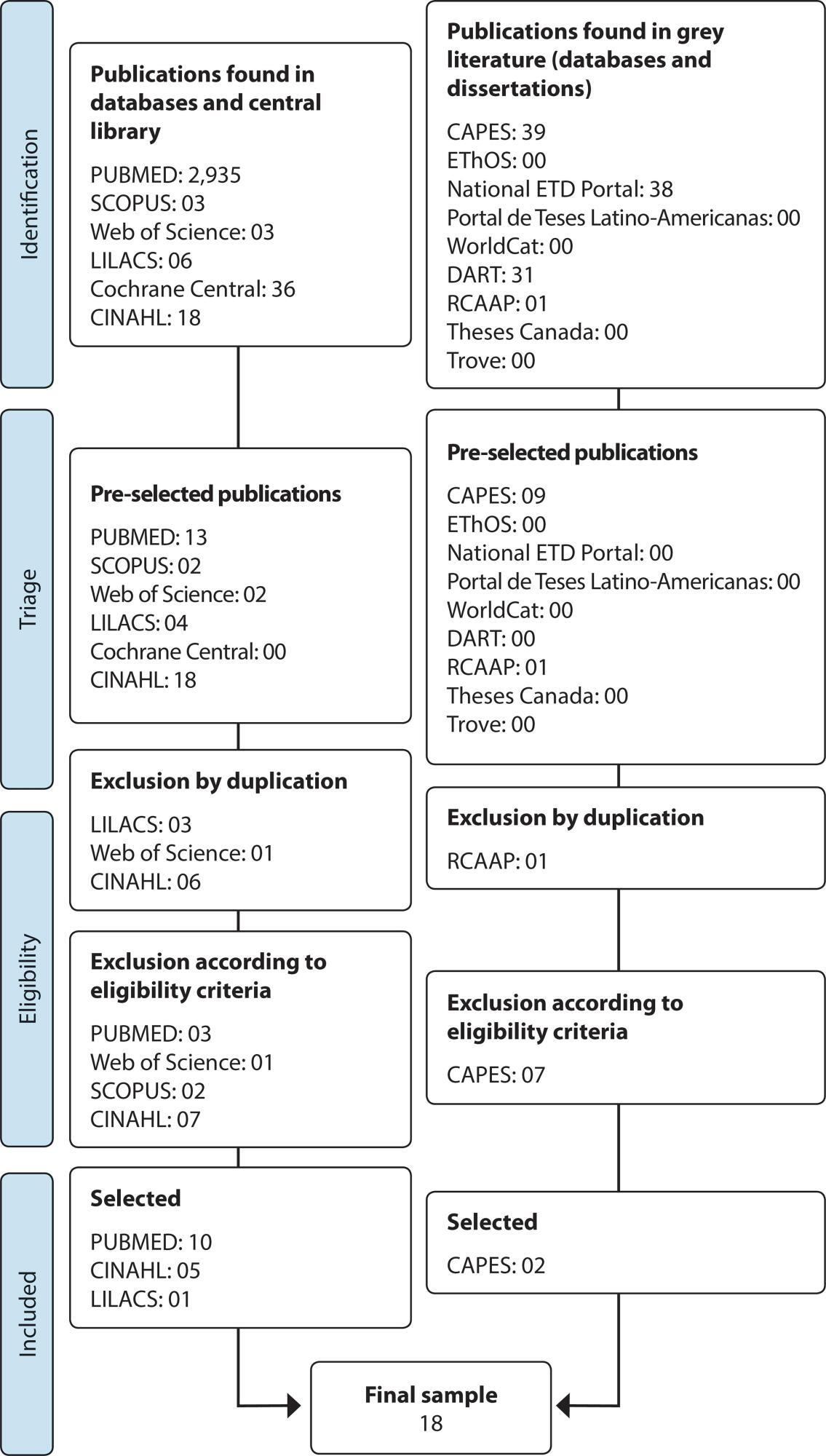
-
ORIGINAL ARTICLE12-05-2019
Functional health literacy in hypertensive elders at primary health care
Revista Brasileira de Enfermagem. 2019;72:266-273
Abstract
ORIGINAL ARTICLEFunctional health literacy in hypertensive elders at primary health care
Revista Brasileira de Enfermagem. 2019;72:266-273
DOI 10.1590/0034-7167-2018-0897
Views0See moreABSTRACT
Objective:
to assess the relationship between inadequate functional health literacy and inadequate blood pressure control in older people with hypertension in Primary Health Care.
Method:
a cross-sectional study with sample calculated at 392. SAHLPA-18 tool was used for functional health literacy; blood pressure was measured; sociodemographic and clinical data were collected. Hierarchical logistic regression was used.
Results:
(high) inadequate blood pressure and (low) functional inadequate health literacy were present in 41.6% and 54.6% of the people, respectively. Factors associated with inadequate blood pressure were: inadequate functional health literacy, black-brown skin color, overweight-obesity, hypertension diagnosis time, non-adherence to exercise/diet, drug treatment. Schooling had no association with inadequate blood pressure
Conclusion:
hypertensive elderly people with inadequate health literacy were more likely to have inadequate blood pressure. Thus, health professionals need to value functional health literacy as a possible component to control blood pressure.
Search
Search in:
Nuvem de Tags
Adolescente (85) Atenção Primária à Saúde (239) COVID-19 (91) Criança (91) Cuidados de Enfermagem (269) Educação em Enfermagem (151) Educação em Saúde (139) Enfermagem (930) Enfermagem Pediátrica (86) Estudantes de Enfermagem (77) Estudos de Validação (131) Família (87) Idoso (208) Promoção da Saúde (99) Qualidade de Vida (104) Saúde do Trabalhador (86) Saúde Mental (145) Saúde Pública (82) Segurança do Paciente (150) Tecnologia Educacional (100)



